Peiran Wang
From Hallucinations to Jailbreaks: Rethinking the Vulnerability of Large Foundation Models
May 30, 2025Abstract:Large foundation models (LFMs) are susceptible to two distinct vulnerabilities: hallucinations and jailbreak attacks. While typically studied in isolation, we observe that defenses targeting one often affect the other, hinting at a deeper connection. We propose a unified theoretical framework that models jailbreaks as token-level optimization and hallucinations as attention-level optimization. Within this framework, we establish two key propositions: (1) \textit{Similar Loss Convergence} - the loss functions for both vulnerabilities converge similarly when optimizing for target-specific outputs; and (2) \textit{Gradient Consistency in Attention Redistribution} - both exhibit consistent gradient behavior driven by shared attention dynamics. We validate these propositions empirically on LLaVA-1.5 and MiniGPT-4, showing consistent optimization trends and aligned gradients. Leveraging this connection, we demonstrate that mitigation techniques for hallucinations can reduce jailbreak success rates, and vice versa. Our findings reveal a shared failure mode in LFMs and suggest that robustness strategies should jointly address both vulnerabilities.
What are Models Thinking about? Understanding Large Language Model Hallucinations "Psychology" through Model Inner State Analysis
Feb 19, 2025Abstract:Large language model (LLM) systems suffer from the models' unstable ability to generate valid and factual content, resulting in hallucination generation. Current hallucination detection methods heavily rely on out-of-model information sources, such as RAG to assist the detection, thus bringing heavy additional latency. Recently, internal states of LLMs' inference have been widely used in numerous research works, such as prompt injection detection, etc. Considering the interpretability of LLM internal states and the fact that they do not require external information sources, we introduce such states into LLM hallucination detection. In this paper, we systematically analyze different internal states' revealing features during inference forward and comprehensively evaluate their ability in hallucination detection. Specifically, we cut the forward process of a large language model into three stages: understanding, query, generation, and extracting the internal state from these stages. By analyzing these states, we provide a deep understanding of why the hallucinated content is generated and what happened in the internal state of the models. Then, we introduce these internal states into hallucination detection and conduct comprehensive experiments to discuss the advantages and limitations.
Astra: Efficient and Money-saving Automatic Parallel Strategies Search on Heterogeneous GPUs
Feb 19, 2025Abstract:In this paper, we introduce an efficient and money-saving automatic parallel strategies search framework on heterogeneous GPUs: Astra. First, Astra searches for the efficiency-optimal parallel strategy in both GPU configurations search space (GPU types and GPU numbers) and parallel parameters search space. Then, Astra also provides the solution on heterogeneous GPUs by mathematically modeling the time consumption of heterogeneous training. At last, Astra is the first to propose the automatic parallel strategy search on money-saving. The experiment results demonstrate that Astra can achieve better throughput than expert-designed strategies. The search time cost for Astra can also be limited to 1.27 seconds in a single-GPU setting and less than 1.35 minutes in a heterogeneous-GPU setting on average with an accuracy of over 95%.
Fair-MoE: Fairness-Oriented Mixture of Experts in Vision-Language Models
Feb 10, 2025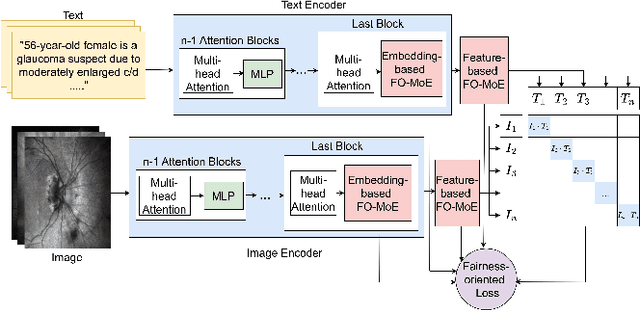
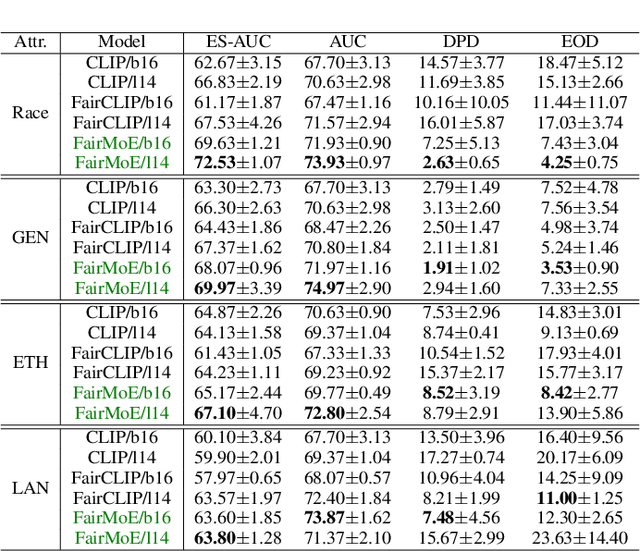

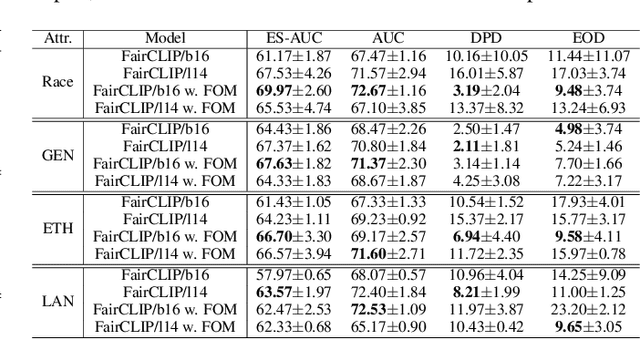
Abstract:Fairness is a fundamental principle in medical ethics. Vision Language Models (VLMs) have shown significant potential in the medical field due to their ability to leverage both visual and linguistic contexts, reducing the need for large datasets and enabling the performance of complex tasks. However, the exploration of fairness within VLM applications remains limited. Applying VLMs without a comprehensive analysis of fairness could lead to concerns about equal treatment opportunities and diminish public trust in medical deep learning models. To build trust in medical VLMs, we propose Fair-MoE, a model specifically designed to ensure both fairness and effectiveness. Fair-MoE comprises two key components: \textit{the Fairness-Oriented Mixture of Experts (FO-MoE)} and \textit{the Fairness-Oriented Loss (FOL)}. FO-MoE is designed to leverage the expertise of various specialists to filter out biased patch embeddings and use an ensemble approach to extract more equitable information relevant to specific tasks. FOL is a novel fairness-oriented loss function that not only minimizes the distances between different attributes but also optimizes the differences in the dispersion of various attributes' distributions. Extended experiments demonstrate the effectiveness and fairness of Fair-MoE. Tested on the Harvard-FairVLMed dataset, Fair-MoE showed improvements in both fairness and accuracy across all four attributes. Code will be publicly available.
RePD: Defending Jailbreak Attack through a Retrieval-based Prompt Decomposition Process
Oct 11, 2024



Abstract:In this study, we introduce RePD, an innovative attack Retrieval-based Prompt Decomposition framework designed to mitigate the risk of jailbreak attacks on large language models (LLMs). Despite rigorous pretraining and finetuning focused on ethical alignment, LLMs are still susceptible to jailbreak exploits. RePD operates on a one-shot learning model, wherein it accesses a database of pre-collected jailbreak prompt templates to identify and decompose harmful inquiries embedded within user prompts. This process involves integrating the decomposition of the jailbreak prompt into the user's original query into a one-shot learning example to effectively teach the LLM to discern and separate malicious components. Consequently, the LLM is equipped to first neutralize any potentially harmful elements before addressing the user's prompt in a manner that aligns with its ethical guidelines. RePD is versatile and compatible with a variety of open-source LLMs acting as agents. Through comprehensive experimentation with both harmful and benign prompts, we have demonstrated the efficacy of our proposed RePD in enhancing the resilience of LLMs against jailbreak attacks, without compromising their performance in responding to typical user requests.
Training on Fake Labels: Mitigating Label Leakage in Split Learning via Secure Dimension Transformation
Oct 11, 2024
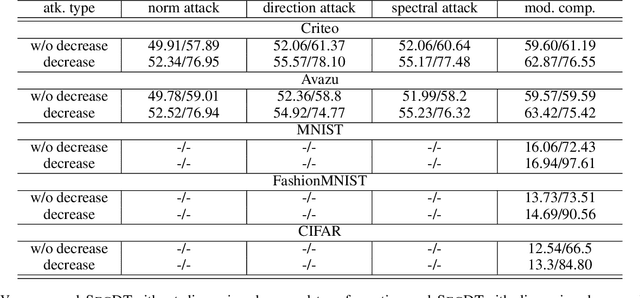
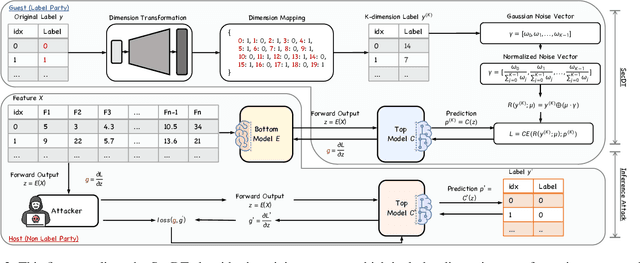
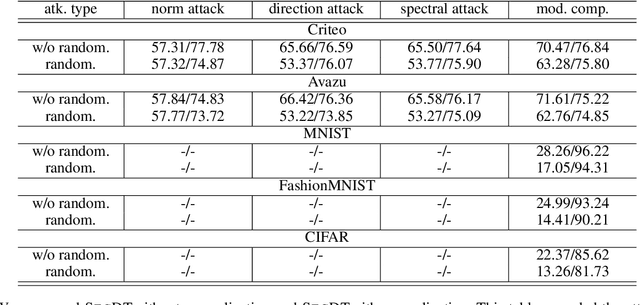
Abstract:Two-party split learning has emerged as a popular paradigm for vertical federated learning. To preserve the privacy of the label owner, split learning utilizes a split model, which only requires the exchange of intermediate representations (IRs) based on the inputs and gradients for each IR between two parties during the learning process. However, split learning has recently been proven to survive label inference attacks. Though several defense methods could be adopted, they either have limited defensive performance or significantly negatively impact the original mission. In this paper, we propose a novel two-party split learning method to defend against existing label inference attacks while maintaining the high utility of the learned models. Specifically, we first craft a dimension transformation module, SecDT, which could achieve bidirectional mapping between original labels and increased K-class labels to mitigate label leakage from the directional perspective. Then, a gradient normalization algorithm is designed to remove the magnitude divergence of gradients from different classes. We propose a softmax-normalized Gaussian noise to mitigate privacy leakage and make our K unknowable to adversaries. We conducted experiments on real-world datasets, including two binary-classification datasets (Avazu and Criteo) and three multi-classification datasets (MNIST, FashionMNIST, CIFAR-10); we also considered current attack schemes, including direction, norm, spectral, and model completion attacks. The detailed experiments demonstrate our proposed method's effectiveness and superiority over existing approaches. For instance, on the Avazu dataset, the attack AUC of evaluated four prominent attacks could be reduced by 0.4532+-0.0127.
DistDD: Distributed Data Distillation Aggregation through Gradient Matching
Oct 11, 2024Abstract:In this paper, we introduce DistDD, a novel approach within the federated learning framework that reduces the need for repetitive communication by distilling data directly on clients' devices. Unlike traditional federated learning that requires iterative model updates across nodes, DistDD facilitates a one-time distillation process that extracts a global distilled dataset, maintaining the privacy standards of federated learning while significantly cutting down communication costs. By leveraging the DistDD's distilled dataset, the developers of the FL can achieve just-in-time parameter tuning and neural architecture search over FL without repeating the whole FL process multiple times. We provide a detailed convergence proof of the DistDD algorithm, reinforcing its mathematical stability and reliability for practical applications. Our experiments demonstrate the effectiveness and robustness of DistDD, particularly in non-i.i.d. and mislabeled data scenarios, showcasing its potential to handle complex real-world data challenges distinctively from conventional federated learning methods. We also evaluate DistDD's application in the use case and prove its effectiveness and communication-savings in the NAS use case.
FedCliP: Federated Learning with Client Pruning
Jan 17, 2023


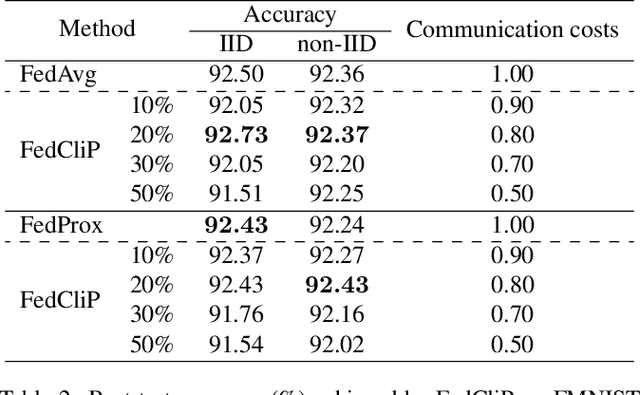
Abstract:Federated learning (FL) is a newly emerging distributed learning paradigm that allows numerous participating clients to train machine learning models collaboratively, each with its data distribution and without sharing their data. One fundamental bottleneck in FL is the heavy communication overheads of high-dimensional models between the distributed clients and the central server. Previous works often condense models into compact formats by gradient compression or distillation to overcome communication limitations. In contrast, we propose FedCliP in this work, the first communication efficient FL training framework from a macro perspective, which can position valid clients participating in FL quickly and constantly prune redundant clients. Specifically, We first calculate the reliability score based on the training loss and model divergence as an indicator to measure the client pruning. We propose a valid client determination approximation framework based on the reliability score with Gaussian Scale Mixture (GSM) modeling for federated participating clients pruning. Besides, we develop a communication efficient client pruning training method in the FL scenario. Experimental results on MNIST dataset show that FedCliP has up to 10%~70% communication costs for converged models at only a 0.2% loss in accuracy.
 Add to Chrome
Add to Chrome Add to Firefox
Add to Firefox Add to Edge
Add to Edge